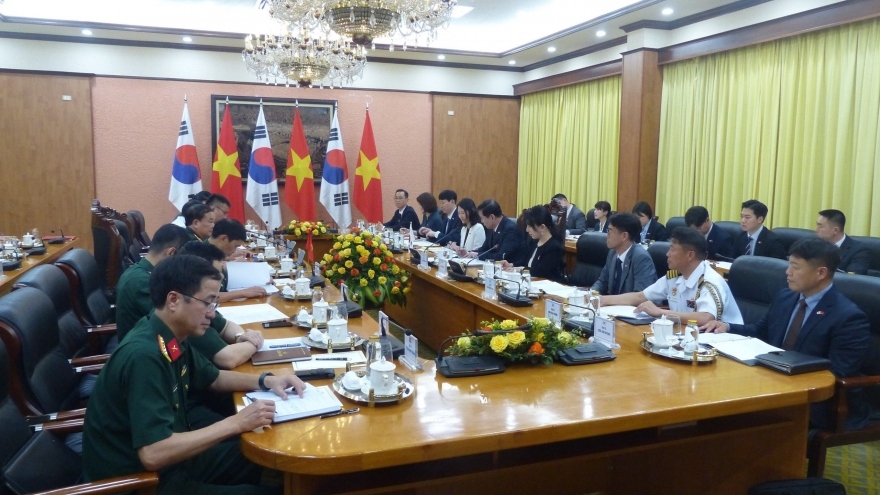Vietnam consistently pursues national defence policy of peaceful self-defence
VOV.VN - The country remains transparent and consistent in carrying out its national defence policy of peaceful self-defence, choosing to stand on the side of justice.
In 2014, the country dispatched its first military officers to join the UN peacekeeping force. In 2019, the nation then published the Vietnam Defence White Paper. These actions demonstrate that the country is always transparent and consistent in implementing its national defence policy of peaceful self-defence, choosing justice, and standing on the side of justice.
In the context of complex international developments, conflicts, and disputes occurring in many places, as well as an increasingly fierce strategic competition occurring between major countries, ensuring the maintenance of a peaceful environment is a prerequisite for the country to develop stably and meet expectations of building a strong and prosperous nation.
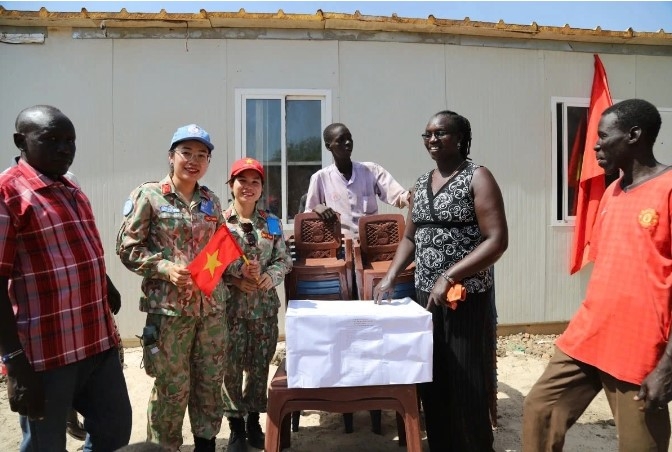
In the luggage of blue beret soldiers of the Vietnam People's Army on their way to UN peacekeeping missions, there is something sacred, neatly wrapped, and arranged in a small backpack.
That is the national flag. With the consent of the mission, they hung the national flag where they live. In the midst of the escalating war, in the midst of the persistent gunfire, the image of the Vietnamese flag fluttering in the sun and wind can be likened to a summer rain that soothes the barren land after many days of drought.
The Vietnamese national flag is soaked in the blood and bones of the ancestors, contains the soul of the nation, and is a symbol of its love and desire for peace.
Major Hoang Xuan Truong, who used to work at the Level 2 Field Hospital No. 2, recalled a memory in which the national flag brought him honour and pride, “When I went out with my comrades, although the distance was quite far, the soldiers of Rwanda happily said loudly: “How are you Vietnam, how are you Vietnam”, it was like a greeting, not only greeting us, but also greeting Vietnam. We were really surprised, happy and also very proud. Proud to see the national flag flying in the sky of South Sudan. We will try to preserve and promote the image of Vietnam in the eyes of international friends.”
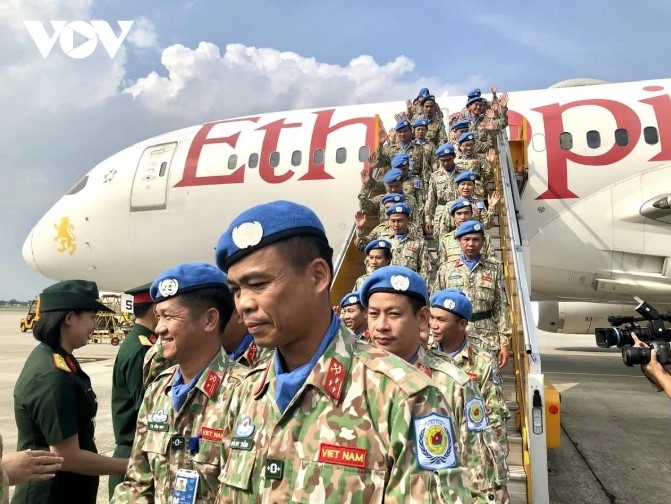
Vietnam has spent more than a thousand years continuously fighting foreign invaders. Therefore, the Vietnamese people fully understand the loss of war and the great value of peace.
For that reason, the nation has sent forces to places where conflicts and political instability are taking place in order to fully engage in global peacekeeping force as a contribution to maintaining peace and stability for humanity.
Historian Professor Pham Hong Tung believes that carrying the image of the national flag by Vietnamese blue beret soldiers is a manifestation of cultural depth and national pride.
“Uncle Ho’s soldiers came to help people and communities in difficulty and they carried the flag of the Fatherland to signal to the whole world that the Vietnamese people are a nation renowned for their martial arts, but we fight so that we can live with humanity in peace. That is extremely important,” said Prof. Tung.
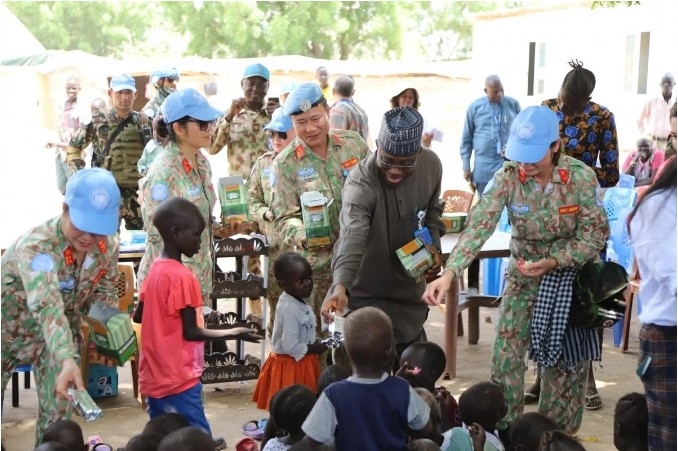
Looking back at Vietnamese history, the nation has gone through more than 20 centuries of war against foreign invasions, with its struggle for independence alone lasting 12 centuries. Rarely has any nation in the world had such a glorious history.
Perhaps that is why Vietnamese people always love and desire peace whilst trying to find solutions to prevent further wars.
And this message was once again affirmed by the Vietnamese Party and State in the 2019 Vietnam Defence White Paper. That is, the Vietnamese defence policy is one of peace and self-defence, not harming the sovereignty of other nations.
According to Major General, Prof. Dr Nguyen Hong Quan, former deputy director of the Institute of National Defence Strategy, the policy of peaceful self-defence is reflected in the practice that the country does not wage war with anyone, does not invade anyone, but retains the right to protect itself when invaded and maintains its right to respond strongly when attacked.
In addition, the policy of peaceful self-defence is also demonstrated in the Vietnam Defence Strategy, which is to conduct a people's war. When the country is at war, the entire population is a soldier, when the country is at peace, a very small army is retained in order to serve as the core of the cause of safeguarding the Fatherland.
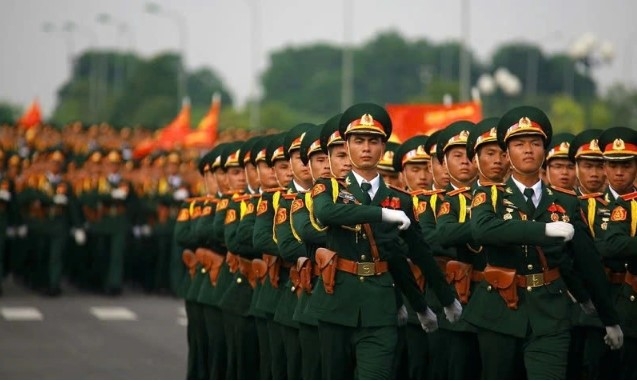
Emerging from war after a long period of embargos, Vietnam has gradually integrated into the wider world, including the sensitive area of defence co-operation.
With the right direction and appropriate steps, defence diplomacy has created mechanisms for the Vietnam People's Army and related countries to resolve challenges. This has narrowed differences in a spirit of mutual understanding whilst tackling problems by peaceful means such as negotiation and through mutual understanding.
This in turn has helped the country to prevent the risks of conflict and war early and from afar. Therefore, Vietnamese defence diplomacy has made great strides in the post-war period.
Dr. Nguyen Minh Vu, former Deputy Minister of Foreign Affairs said, “We see that, before the renovation, we have maintained defence cooperation with 30 countries, but now our defence cooperation has expanded to more than 100 countries. We have also established direct defence agencies across 33 countries as well as concurrent defence agencies in 41 countries and at the United Nations. Not all is related to arms procurement, but most are related to enhancing political trust to share experience and step up cooperation, thus creating common mechanisms to address common security challenges.
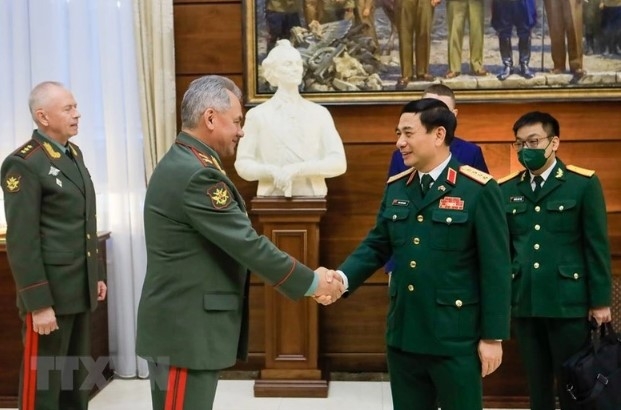
Vietnam always yearns for peace and wishes the world to live in complete peace. That was also the affirmation of General Phan Van Giang, Politburo member, Deputy Secretary of the Central Military Commission, Minister of National Defence when speaking to the international community at the Shangri-La Dialogue in 2022.
“Throughout history, the Vietnamese people have gone through many self-defence wars, suffering much pain and loss. Even today, when the war has been over for nearly half a century, the consequences and legacy of war are still a heavy burden for our country. Vietnam understands the value of peace, wishes to maintain and is determined to preserve national peace, to protect independence, freedom, sovereignty, territorial integrity, national interests. We also aspire for the world, the region, all countries and ethnic groups to enjoy peace, freedom, prosperity and happiness,” Giang said.
Recently, Party General Secretary To Lam delivered a speech at the Ho Chi Minh National Academy of Politics about the new era, which is set to be the era of the nation’s rise. The Party chief stated, "The world is in a period of epochal change, from now until 2030 is the most important period to establish a new world order, this is also a period of important strategic opportunity, the final stage of the Vietnamese revolution to achieve the 100-year strategic goal under the leadership of the Party, creating a solid premise to achieve the 100-year goal of national founding.
The epochal change brings new opportunities and advantages, but also numerous challenges, in which the challenges are more prominent and new opportunities can also appear in the moment between sudden changes in the world situation.
For the nation to enter the era of growth, keep pace with the times, and integrate with international friends on all continents, a peaceful and stable environment is needed, enabling people to feel secure and focus their efforts on economic development, national construction, while attracting investors as a mean of creating jobs, income, and elevating the country's potential and position.
Faced with such great demands and challenges, more than ever, the army continues to be the core force to solidify national defence, safeguard the Fatherland, while accompanying the nation in an effort to overcome challenges for a strong and prosperous Vietnam."

